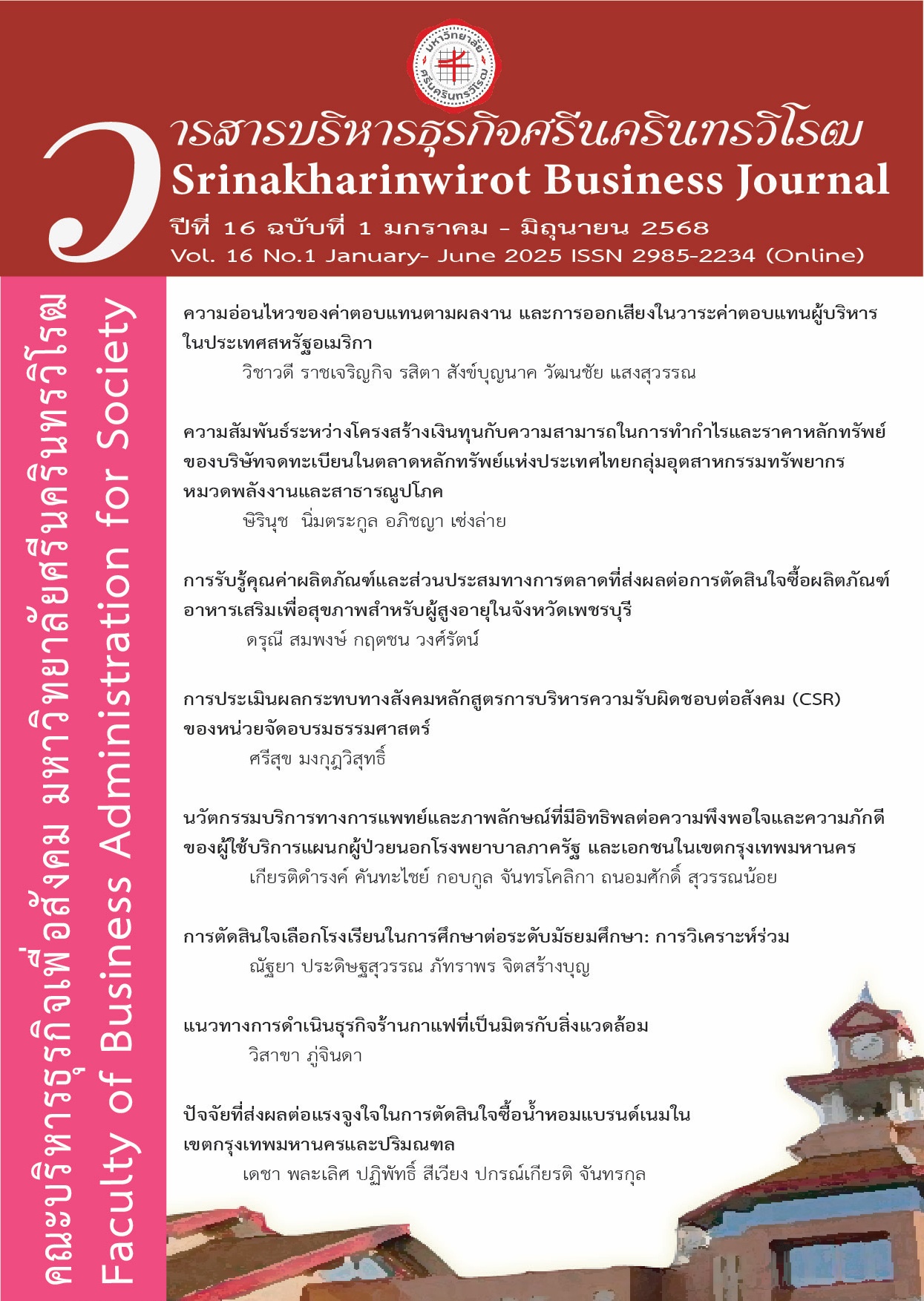ความอ่อนไหวของค่าตอบแทนตามผลงาน และการออกเสียงในวาระค่าตอบแทนผู้บริหารในประเทศสหรัฐอเมริกา
คำสำคัญ:
ค่าตอบแทนผู้บริหาร, ความอ่อนไหวของค่าตอบแทนตามผลงาน, การออกเสียงในวาระค่าตอบแทนผู้บริหารบทคัดย่อ
การออกเสียงในวาระค่าตอบแทนผู้บริหารในประเทศสหรัฐอเมริกากำหนดให้ผู้ถือหุ้นเป็นผู้ออกเสียงในการประเมินค่าตอบแทนผู้บริหาร และตัดสินใจต่อการออกเสียง รับ หรือ ไม่รับ โครงการค่าตอบแทน โดยผ่านการประเมินความอ่อนไหวของค่าตอบแทนตามผลงาน (Pay-Performance Sensitivity: PPS) โครงการค่าตอบแทนผู้บริหารควรได้รับการอนุมัติเมื่อมูลค่าของ PPS อยู่ในระดับสูง และไม่ควรได้รับการอนุมัติเมื่อมูลค่าของ PPS ต่ำหรือติดลบ อย่างไรก็ตาม มีข้อโต้แย้งว่า โครงการค่าตอบแทนผู้บริหารที่มี PPS สูงเกินไป อาจทำให้ผู้บริหารมีพฤติกรรมหลีกเลี่ยงความเสี่ยง ซึ่งส่งผลกระทบในเชิงลบต่อผลการดำเนินงานของบริษัทในระยะยาว งานวิจัยนี้มีวัตถุประสงค์เพื่อศึกษาการออกเสียงไม่รับโครงการค่าตอบแทนในกลุ่มบริษัท S&P 1500 ว่ามีความสัมพันธ์ต่อ PPS ที่สูงเกินไปหรือไม่ ตัวแบบงานวิจัยแสดงความสัมพันธ์ระหว่างผลการดำเนินงานของบริษัทและโครงการค่าตอบแทนของผู้บริหาร ชี้ให้เห็นว่า PPS ซึ่งถูกแสดงด้วยตัวแปรหุ่นของกลุ่มตัวอย่างบริษัทที่มีผลการลงคะแนนเสียงไม่รับโครงการค่าตอบแทนเพิ่มสูงขึ้นอย่างมีนัยสำคัญจากปีที่แล้ว การวิเคราะห์แบบจำลองแบบหลายระดับถูกใช้ในการตรวจสอบความสัมพันธ์เพื่อควบคุมอิทธิพลทั้งแบบถาวรและแบบสุ่ม เช่นเดียวกับตัวแปรควบคุมซึ่งถูกนำมาใช้เพื่อควบคุมอิทธิพลที่สำคัญอื่นๆ ต่อโครงการค่าตอบแทนของผู้บริหาร ผลการวิจัยแสดงให้เห็นว่าข้อโต้แย้งที่เกี่ยวข้องกับความอ่อนไหวต่อประสิทธิภาพการจ่ายเงินมากเกินไปได้ถูกรวมไว้ในการออกเสียงซึ่งสามารถขยายขอบเขตของวรรณกรรมที่เกี่ยวข้องกับความอ่อนไหวของค่าตอบแทนตามผลงานและการตัดสินใจออกเสียงและให้คำแนะนำสำหรับผู้ถือหุ้นในการประเมิน
เอกสารอ้างอิง
Aggarwal, R. K., & Samwick, A. A. (1999). The other side of the trade-off: The impact of risk on executive compensation. Journal of Political Economy, 107(1), 65-105.
Amzaleg, Y., Azar, O. H., Ben-Zion, U., & Rosenfeld, A. (2014). CEO control, corporate performance and pay-performance sensitivity. Journal of Economic Behavior & Organization, 106, 166-174.
Armstrong, C. S., Gow, I. D., & Larcker, D. F. (2013). The efficacy of shareholder voting: Evidence from equity compensation plans. Journal of Accounting Research, 51(5), 909-950.
Balsam, S., Boone, J., Liu, H., & Yin, J. (2016). The impact of say-on-pay on executive compensation. Journal of Accounting and Public Policy, 35(2), 162-191.
Brick, I. E., Palmon, O., & Wald, J. K. (2012). Too Much Pay-Performance Sensitivity? The Review of Economics and Statistics, 94(1), 287-303. https://doi.org/10.1162/REST_a_00142
Brunarski, K. R., Campbell, T. C., & Harman, Y. S. (2015). Evidence on the outcome of Say-On-Pay votes: How managers, directors, and shareholders respond. Journal of Corporate Finance, 30, 132-149.
Chen, H., Jeter, D., & Yang, Y.-W. (2015). Pay-performance sensitivity before and after SOX. Journal of Accounting and Public Policy, 34(1), 52-73.
Clarkson, P. M., Walker, J., & Nicholls, S. (2011). Disclosure, shareholder oversight and the pay–performance link. Journal of Contemporary Accounting & Economics, 7(2), 47-64.
Core, J., & Guay, W. (2002). Estimating the value of employee stock option portfolios and their sensitivities to price and volatility. Journal of Accounting Research, 40(3), 613-630.
Core, J. E., Guay, W., & Larcker, D. F. (2008). The power of the pen and executive compensation. Journal of Financial Economics, 88(1), 1-25.
Core, J. E., Holthausen, R. W., & Larcker, D. F. (1999). Corporate governance, chief executive officer compensation, and firm performance. Journal of Financial Economics, 51(3), 371-406.
De Falco, S. E., Cucari, N., & Sorrentino, E. (2016). Voting dissent and corporate governance structures: The role of say on pay in a comparative analysis. Corporate Ownership & Control, 13(4), 188-196.
De Franco, G., Hope, O.-K., & Larocque, S. (2013). The effect of disclosure on the pay-performance relation. Journal of Accounting and Public Policy, 32(5), 319-341.
Del Guercio, D., Seery, L., & Woidtke, T. (2008). Do boards pay attention when institutional investor activists “just vote no”? Journal of Financial Economics, 90(1), 84-103.
Duffhues, P., & Kabir, R. (2008). Is the pay–performance relationship always positive?: Evidence from the Netherlands. Journal of Multinational Financial Management, 18(1), 45-60.
Fang, V. W., Noe, T. H., & Tice, S. (2009). Stock market liquidity and firm value. Journal of Financial Economics, 94(1), 150-169.
Ferri, F., & Maber, D. A. (2013). Say on pay votes and CEO compensation: Evidence from the UK. Review of Finance, 17(2), 527-563.
Fisch, J., Palia, D., & Solomon, S. D. (2018). Is say on pay all about pay: The impact of firm performance. Harvard Business Law Review, 8, 101.
Jensen, M. C., & Murphy, K. J. (1990). Performance pay and top-management incentives. Journal of Political Economy, 98(2), 225-264.
Kimbro, M. B., & Xu, D. (2016). Shareholders have a say in executive compensation: Evidence from say-on-pay in the United States. Journal of Accounting and Public Policy, 35(1), 19-42.
Liang, Y., Moroney, R., & Rankin, M. (2020). Say‐on‐pay judgements: The two‐strikes rule and the pay‐performance link. Accounting & Finance, 60, 943-970.
Obermann, J., & Velte, P. (2018). Determinants and consequences of executive compensation-related shareholder activism and say-on-pay votes: A literature review and research agenda. Journal of Accounting Literature, 40(1), 116-151.
Paminto, U. H. A., & Ardi, H. (2015). Corporate Governance and Firm Value: The mediating effect of financial performance and firm risk. Corporate Governance, 7(35), 18-24.
Stathopoulos, K., & Voulgaris, G. (2016). The importance of shareholder activism: The case of say‐on‐pay. Corporate Governance: An International Review, 24(3), 359-370.
Velte, P., & Obermann, J. (2021). Compensation-related institutional investor activism–a literature review and integrated analysis of sustainability aspects. Journal of Global Responsibility, 12(1), 22-51.
ดาวน์โหลด
เผยแพร่แล้ว
รูปแบบการอ้างอิง
ฉบับ
ประเภทบทความ
สัญญาอนุญาต
ลิขสิทธิ์ (c) 2025 วารสารบริหารธุรกิจศรีนครินทรวิโรฒ

อนุญาตภายใต้เงื่อนไข Creative Commons Attribution-NonCommercial-ShareAlike 4.0 International License.
ลิขสิทธิ์ของบทความที่ได้รับการตีพิมพ์ในารสารบริหารธุรกิจศรีนครินทรวิโรฒ เป็นของวารสาร โดยผู้เขียนยินยอมโอนสิทธิ์ในการเผยแพร่และจัดพิมพ์บทความให้แก่วารสาร เมื่อบทความได้รับการตอบรับเพื่อตีพิมพ์ วารสารมีสิทธิ์ในการจัดพิมพ์ เผยแพร่ และจัดเก็บบทความในรูปแบบสิ่งพิมพ์และสื่ออิเล็กทรอนิกส์
ทางวารสารอนุญาตให้นำเนื้อหาไปใช้เพื่อประโยชน์ทางการศึกษาและการวิจัยที่ไม่แสวงหากำไรได้ โดยต้องอ้างอิงแหล่งที่มาอย่างถูกต้องครบถ้วน การนำไปใช้ ดัดแปลง เผยแพร่ซ้ำ หรือใช้ในเชิงพหาณิชย์ ต้องได้รับอนุญาตเป็นลายลักษณ์อักษรจากวารสารก่อน






